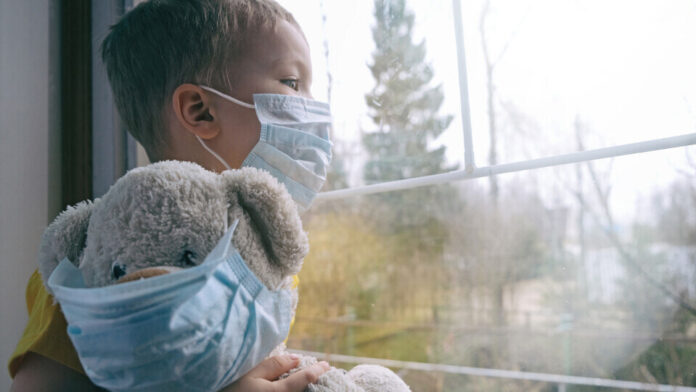Parents, students, and employees are ramping up complaints about mask mandates, in which they not only question the impact masks are having on physical health but the psychological and social that have resulted from extensive use of face coverings.
Mask mandates for children are getting particular attention. In November, Citizens for Free Speech (CFFS), an activist organization, developed an online forum in November for parents and caregivers to share stories of the negative effects of children having to wear masks.
The website, called nomasksforkids.com has divided up complaints into separate categories: psychological, neurological, dermal, and dental; and eye, ear, and breathing.
The complaints describe children suffering from headaches, skin reactions, allergies, anxiety, mouth sores, and breathing difficulties. Reports also describe children resisting masks being segregated and feeling like outcasts.
The site also links to several studies questioning the efficacy of masks against viral infections. The goal of the site is to collect as many verifiable stories of mask trauma as possible, says Patrick Wood, CCFP director.
“The suffering of a few kids might not generate the attention or actions required but hearing the first-hand accounts of the suffering of thousands will force the powers-that-be to do something about it,” Wood said in a news release.
Within two hours of the site going live, 70 incidents of mask harm to children were reported.
Researchers, Interested
The site is going strong today, Wood told Health Care News.
“Complaints continue to come in and we have received contacts from researchers who want to investigate these events,” Wood said. “That, we didn’t expect.”
Already, researchers are looking at the impact of masks on health. A German preliminary study published this fall by Research Square found that the majority of students wearing masks reported negative health impacts. Nearly 70 percent of the 25,000 children surveyed experienced negative physical, psychological, and behavioral health effects of mask-wearing, according to parents and caregivers.
The data could prove helpful in several lawsuits that have emerged challenging mask mandates, particularly for children. In September, two dozen parents filed suit against the state of Ohio for requiring K-12 students to wear masks. A Catholic school in Michigan sought injunctive relief from having to require kindergarteners from having to wear masks for extended periods of time, even though the school added more safety measures than required by the U.S. Centers for Disease Control and Prevention.
Children and Herd Immunity
Because children are the least likely to suffer some of the worst complications from COVID-19, including death, there is growing opinion that the nation is missing an opportunity to build up natural “herd” immunity from the SARS-COV-2 virus. Masks and school lockdowns make that difficult.
Early in the pandemic, Knut Wittkowski, a biostatistician with the Department of Biostatistics, Epidemiology, and Research Design at The Rockefeller University recommended schools be kept open for this very reason.
In an interview with the Press & The Public Project in April, in which he discussed his March 2020 paper, Wittkowski said the only thing that stops respiratory diseases is herd immunity.
“About 80 percent of the people need to have had contact with the virus, and the majority of them won’t even have recognized that they were infected, or they had very, very mild symptoms, especially if they are children,” Wittkowski said. “So it’s very important to keep the schools open and kids mingling to spread the virus to get herd immunity as fast as possible, and then the elderly people, who should be separated, and the nursing homes.”
Months later, as the world is witnessing a surge of COVID-19 cases, Wittkowski seems to have been proven right.
Wittkowski discussed how herd immunity can protect communities for years. “If we had herd immunity now, there couldn’t be a second wave in autumn,” Wittkowski said in the April interview. “Herd immunity lasts for a couple of years, typically, and that’s why the last SARS epidemic we had in 2003 lasted 15 years.”
The Rockefeller University issued a disclaimer against Wittkowski on April 13 for his views.
Ashley Bateman (bateman.ae@googlemail.com) writes from Alexandria, Virginia.
AnneMarie Schieber (amschieber@heartland.org) is the managing editor of Health Care News.





















